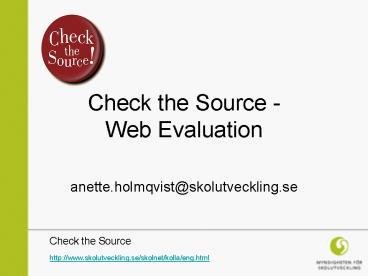Check the Source Web Evaluation - PowerPoint PPT Presentation
1 / 23
Title:
Check the Source Web Evaluation
Description:
All information needs to be evaluated - printed as well as webpages ... Is the purpose to inform, to persuade, to sell or to entertain? ... – PowerPoint PPT presentation
Number of Views:28
Avg rating:3.0/5.0
Title: Check the Source Web Evaluation
1
Check the Source -Web Evaluation
- anette.holmqvist_at_skolutveckling.se
Check the Source
http//www.skolutveckling.se/skolnet/kolla/eng.htm
l
2
Why source criticism?
- Information is rarely neutral
- All information needs to be evaluated - printed
as well as webpages - The ability to critically evaluate
- sources is necessary in the information age
Check the Source
http//www.skolutveckling.se/skolnet/kolla/eng.htm
l
3
What is source criticism?
- To critically check and interpreta document, an
image or a statement - To find out if the source is accurate
- To find out what is true or at least probable
Check the Source
http//www.skolutveckling.se/skolnet/kolla/eng.htm
l
4
Evaluation Criteria
- Accuracy - Is the source verified?
- Authorship - Who is the author?
- Objectivity - Is the information biased?
- Currency - Is the content up-to-date?
- Coverage - What topics are included?
Check the Source
http//www.skolutveckling.se/skolnet/kolla/eng.htm
l
5
Before you accept
- Ask who posted this information!
- Ask what is the intent of the message!
Check the Source
http//www.skolutveckling.se/skolnet/kolla/eng.htm
l
6
Books and Articles
- Who is the author?
- Who is the editor?
- When was it published?
- Is the content reliable?
- Is the content adequate to and does it cover
your topic?
Check the Source
http//www.skolutveckling.se/skolnet/kolla/eng.htm
l
7
Problems with web evaluation
- Anyone can publish on the net
- Mixture of advertising and information
- The hyperlink and framesystem might be confusing
- Webpages disappear
Check the Source
http//www.skolutveckling.se/skolnet/kolla/eng.htm
l
8
Evaluate webpages - method
- Start with checking the Internetaddress (URL) of
the document - The URL might say something about the publisher
of the website
Check the Source
http//www.skolutveckling.se/skolnet/kolla/eng.htm
l
9
Go back to startpage
- Search engines often retrieve pages out of
content - Return to the startpage to find the source of
information
Check the Source
http//www.skolutveckling.se/skolnet/kolla/eng.htm
l
10
Decode the URL
- http//www.skolutveckling.se/skolnet/kolla/index.h
tml - http// transfer protocol
- www.skolutveckling.se servername.domain
- .se country code
- /skolnet/ directory
- /kolla/ subdirectory
- index.html filename.filetype
Check the Source
http//www.skolutveckling.se/skolnet/kolla/eng.htm
l
11
Internet Domains
- Domain is the institution, organization or
enterprise where you can find the host computer
to the actual website
Check the Source
http//www.skolutveckling.se/skolnet/kolla/eng.htm
l
12
Top Level Domains
- National domains - two-lettered country codes for
example .se .ie. Find more athttp//www.ur.se/ny
hetsjournalistik/31an.html - International domains - type of organization for
example .com .org .gov .edu .mil
Check the Source
http//www.skolutveckling.se/skolnet/kolla/eng.htm
l
13
Check Domain Name
- http//www.allwhois.com/
- http//speednames.com
- http//www.ripe.net/perl/whois
Check the Source
http//www.skolutveckling.se/skolnet/kolla/eng.htm
l
14
Who is the author?
- Who created the website?
- Is the author well known? If not look for the
authors name in an encyclopedia! - Is the author affiliated to an organization?
- Is the authors email included?
- Dont use anonymous material!
Check the Source
http//www.skolutveckling.se/skolnet/kolla/eng.htm
l
15
Personal Websites
- The URLs often ends with a directory like
/users/ or /people/ followed by a personal name - The URLs often ends with a tilde /for example
/john
Check the Source
http//www.skolutveckling.se/skolnet/kolla/eng.htm
l
16
What more to find out?
- Is there a list of content or an index?
- Is there a sitemap for better navigation?
- Is the purpose of the site clearly stated?
Check the Source
http//www.skolutveckling.se/skolnet/kolla/eng.htm
l
17
Check the content
- What is the purpose of the website?
- Is the purpose to inform, to persuade, to sell or
to entertain? - Are there editors and fact checkers?
- Is the content suited to and useful for your
purpose? - Is the text free from errors?
Check the Source
http//www.skolutveckling.se/skolnet/kolla/eng.htm
l
18
Bibliography or linklist?
- Is a bibliography included?
- Are there any links to other resources about the
topic? - Are the links up-to-date?
Check the Source
http//www.skolutveckling.se/skolnet/kolla/eng.htm
l
19
Who links to the website?
- Are there any links to the webpage from another
document that you trust? - To find out you can writelinkactual URL in a
search engine - Be careful, good webpages canlink to bad ones!
Check the Source
http//www.skolutveckling.se/skolnet/kolla/eng.htm
l
20
Currency
- Is there a date included that tells you when the
page was made? - Is there a date of last update?
Check the Source
http//www.skolutveckling.se/skolnet/kolla/eng.htm
l
21
Citing webpages
- Author
- Title of page
- Date of posting/revision
- Date of access
- URL (webaddress)
Check the Source
http//www.skolutveckling.se/skolnet/kolla/eng.htm
l
22
Dont forget
- to compare with other sources other webpages,
books, articles etc - to use many sources
Check the Source
http//www.skolutveckling.se/skolnet/kolla/eng.htm
l
23
Read more...
- Check the Source - the webpage
- http//www.skolutveckling.se/skolnet/kolla/eng.htm
lanette.holmqvist_at_skolutveckling.se
Check the Source
http//www.skolutveckling.se/skolnet/kolla/eng.htm
l































